After
rainy season – anywhere from tropical to temperate zones, all humid forests
have celebrated plenty of new lives. Fruits are getting ripe on branches and
underneath layers of decayed leaves, another dynamic world are waking up.
Around the trees, mushroom of all kinds have opened their eyes after a long
nap.
Termite mushroom
Being
the unique and exclusive specialty of the southwest Vietnam for years, termite
mushroom is a particularly symbiosis type in all of aspects: its life, its
nutrition, and its unique flavor.
Termite
mushroom is rich in calcium, phosphorus, iron, protein, and nutrients, which
are all good for health, especially for people with diabetes. Due to the high
phosphorus content, it is beneficial for patients and the elderly. Daily meals
with a proper amount of termite mushrooms can improve immunity against cancer
cells, anti-aging, and reduce blood sugar (according to traditional Chinese
medicine). Not only nourishing, the mushroom is also incredible sweet and
crispy. Either to make porridge, to stir-fry, to grill, to make broth, or even
to make pancake are simple yet efficient ways to exploit the best of termite
mushroom.
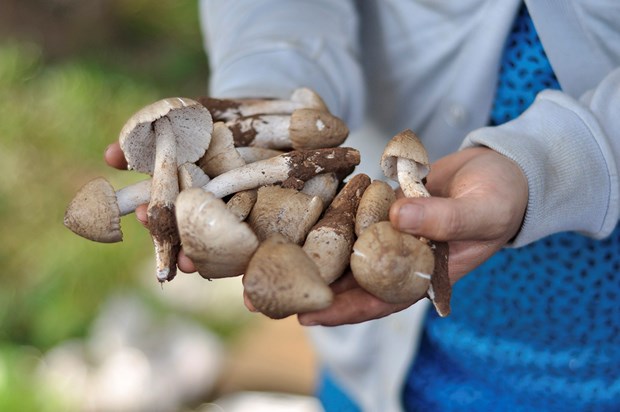
Fresh picked termite mushroom.
Until
now, this odd mushroom has been only found in Africa and Asia. It usually
gathers on higher mounds around a termite nest. With its strange symbiosis relationship
of the Mother Nature, the mushroom is fed by nutrition from termites and in
versus, the termites have eaten rotten mushroom.
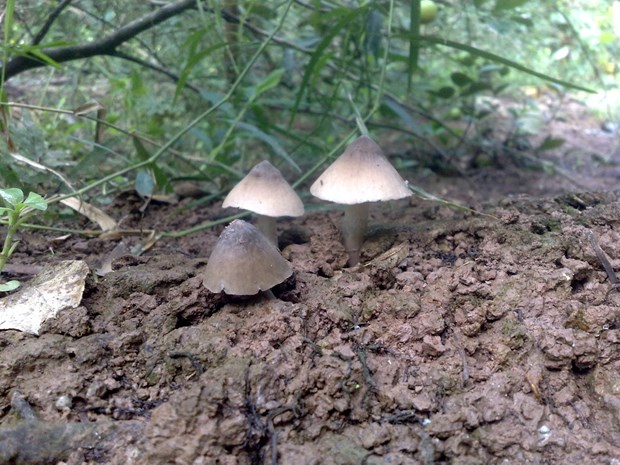
Mushroom on a termite nest.
To
collect termite mushroom, people have to wait until the right time. At the end
of summer and beginning of autumn, after some rainy days must be a sunny day,
and that’s the time. Full of food and water, spores eagerly grow onto the
ground with a button-like looking. About a day later, the mushroom has grown
almost 10 times from yesterday. Who want to pick termite mushroom must wake up
really early in the dark morning and go for hunting because after sunrise, this
mushroom will open its cap and collapse quickly. Unopened termite mushroom is
about 3 – 4cm height with a crunchy stem so that people can just take them up
quite easily or they can use a bamboo stick to dig them up. Grapevines said
that termite mushroom hated metal so if you use metallic tool to collect them,
they will not grow again on that place. So far this fabulous mushroom can’t be
farm-raised anywhere so hunters treat them and their partner with the best
care, hoping to see them next season.
Bitter bolete
Like
termite mushroom, bitter typopilus mushroom (Tylopilus felleus) only grow under
specific places, mostly within white paper-bark forests. In Vietnam there are 2
types of the unique mushroom, one grows in white paper-bark forests and the
other grows in acacia forests. White paper-bark and acacia are really similar
so these 2 types of mushrooms are very much the same. However, gourmets always
prefer which is from white paper-bark forests. They said that although acacia
mushroom is bigger, its flavor is much lighter while white paper-bark has a
stunningly bitter flavor and an amazingly sweet after-taste. Briefly, the best
bitter bolete must be from Phu Quoc (Kien Giang province)
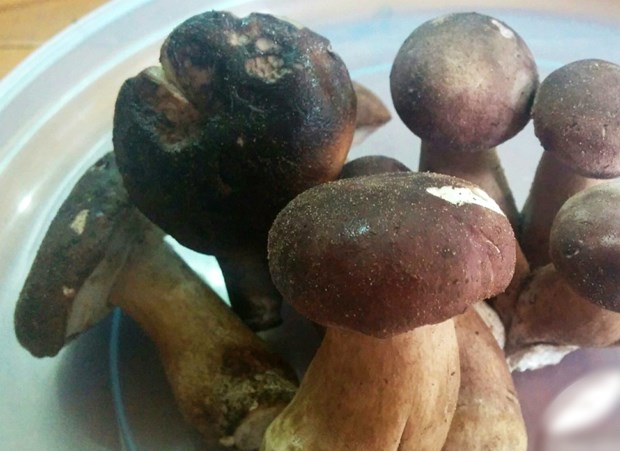
Bitter bolete from Phu Quoc island.
Its
season is quite short and its life span is short, too. After long rainy days,
purple tiny caps suddenly appear on decayed layers in white paper-bark forest.
They quickly grow and quickly die off within a week. They usually grow in
clusters, about 5 to 10 units. This mushroom is short with a brown-purple cap,
which is so easy to blend into old leaves. Mushroom pickers must go into the
forests in early morning because when sunlight comes out, somehow we don’t see
them anymore. It’s so strange, isn’t it?!
Fresh-picked
bitter bolete must be throughout cleaned before any preparation (peeling,
washing, soaking in salt water to reduce the bitterness). Bitter bolete has an
annoying yet tempted bitterness, a gooey yet crunchy texture as beef brisket.
Especially, it carries a pleasure after-taste, which can’t find from any
mushroom. Because of that bitterness, people have believed that the mushroom
contains natural antibiotic. They’re confident about its great effects in
healing stomachache; according to oriental medicine, bitter bolete also can
treat common flu, headache, and support organs since it contains essential oil
from the trees, which two of the most common chemotypes are based on methyl
eugenol and E-methyl isoeugenol.
The
luxurious bitterness of the picky mushroom is just in harmony with seafood
porridge, stir-frying with seafood or steaming with eggs and minced pork, which
are always available in Phu Quoc island. The fishy smell of seafood and eggs is
easily reduced by that bitterness while the umami taste of seafood is
incredibly enhanced. Dishes from bitter bolete are strange yet interesting,
impressive but very hard to enjoy if you’re not a bitter lover.
As
people who are addicted to alcohol, tea, or coffee, the bitterness of this
mushroom is so addictive. It’s like durian – once tasted, you will love it or
you will hate it.
Pine mushroom
The
value of pine mushroom in domestic Vietnam is as high as Matsutake mushroom
within Japan. Pine mushroom obviously should be from pine forests, mostly found
in Lam Dong province, Hue city, Bac Giang and Son La province in the north.
Under the fallen pine leaves, pine mushroom has appeared at the end of summer
and beginning of fall. It can grow up in single or several caps grow together.
The mature pine mushroom is quite big with maximum height about 15cm and the
maximum cap’s diameter about 15cm, too. Depending on regional soil and climate,
pine mushroom’s color ranks from dark yellow to brown.
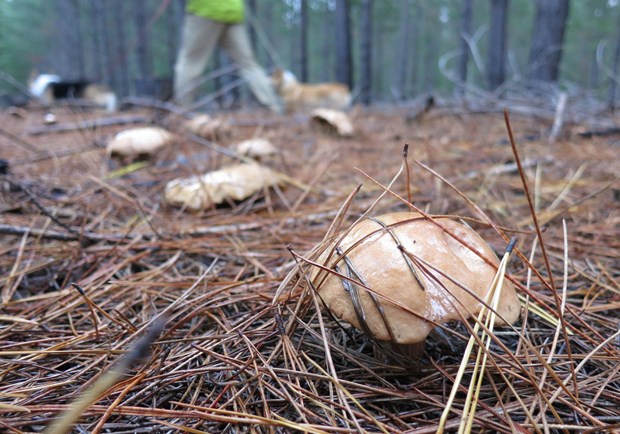
Pine mushroom in Lam Dong.
Yellow
pine mushroom is also called beef’s liver mushroom because its shape and color
look exactly like it. The flesh of pine mushroom is really thick and it
contains ameliorates essential oil from pine trees so it tastes like chewing a
piece of pinewood. After collected, pine mushroom will be washed and soaked in
salted water around half an hour to make the flesh crunchier. The best way to
enjoy this fake beef’s liver is to grill or to cook in porridge. The flavors of
wild mushroom are too feature and impressive to be complicated processed.
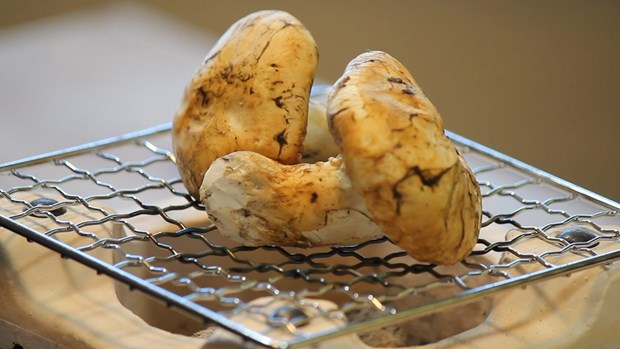
Grilled pine mushroom.
Pine
mushroom contains chromium, high source of vitamins and mineral. Therefore,
people believe that they can prevent common cancers, treat diabetes, and help
anti-aging.
Shiitake mushroom
This
is the most popular mushroom that we can see in any household’s kitchen since
it’s not as picky or rare as above types but its nutrition is not any less.
Wild
shiitake usually grows in humid but clean areas, which ideally is on trunks of
broadleaved trees as oak, or chestnut. Shiitake is easily to develop,
especially in northwest highland areas. They can grow year round in average
humidity and cool temperature. However, at the end of fall and winter comes,
when the air is full of humidity and cold, shiitake grows to its best quality.
Its stalk is chubby and succulent, its cap is thick, and its flavor is
super-tasty and aromatic. This is the time when people try to collect as much
shiitake as they can to dry them and store for a whole year.
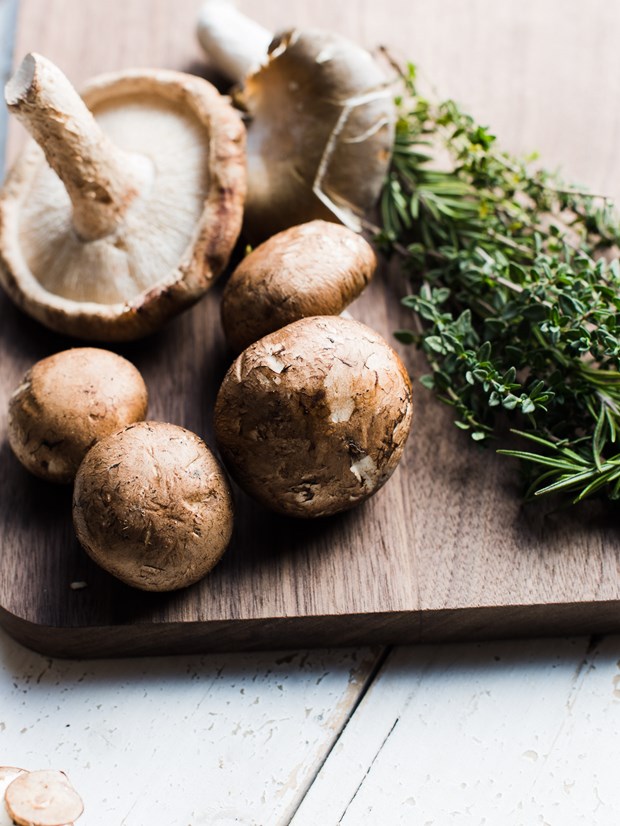
Fresh shiitake mushroom in kitchen.
Wild
shiitake contains lot of protein, which can be compared to animal protein, and
especially rich in minerals, in which potassium accounts for 64%. In addition,
shiitake is also rich in vitamins C, B, pre-vitamin D, vitamin B2 and essential
nutrients such as calcium, magnesium, iron, aluminum, Niacin, protein, and
fiber to enhance human body’s resistance.
Nowadays,
shiitake is mostly farm-raised but only the wild mushroom is much more
excellent in flavor and taste that nothing artificial can be compared.
Thu Pham